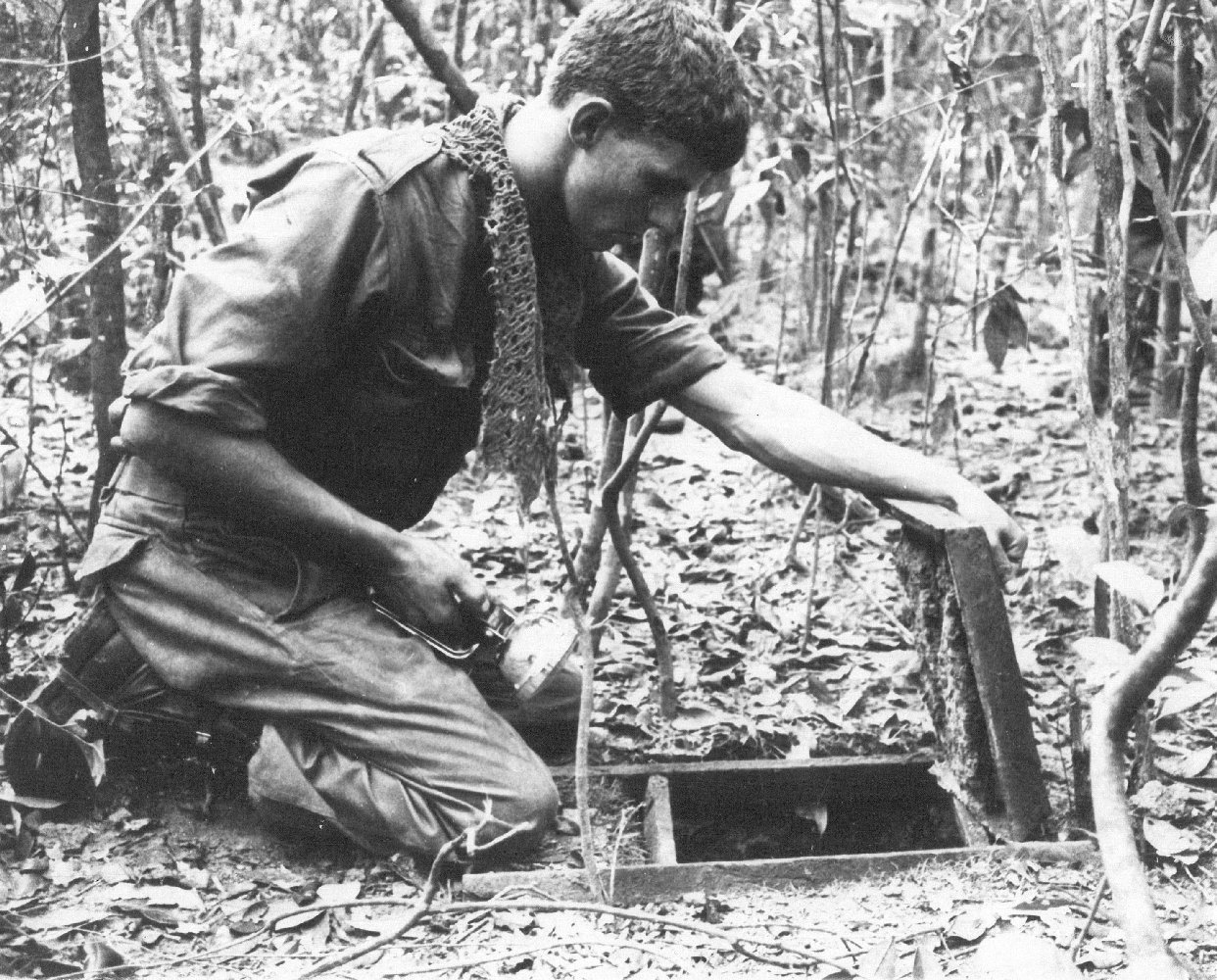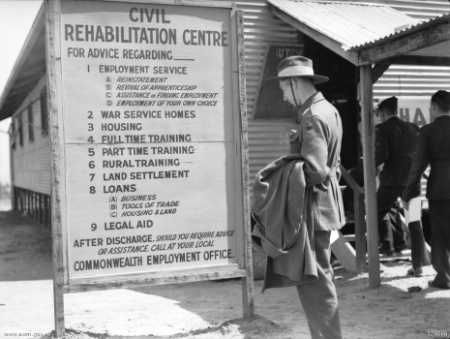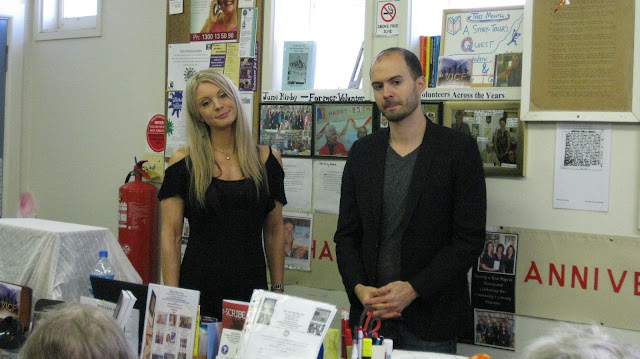The Soldier Whose Sister Didn't Leave: Reflecting on Geri Colson's Author Talk & Loyalty to her Brother - 11am, Saturday, 23 March 2019
Reflection by Paul Karp
Visit Paul Karp's Poetry Website at:
Mentone author Geraldine Colson moved from neighbouring Cheltenham two
years ago. She quickly picked up Mentone's cultural bent through her
play-writing contribution to Moorabbin Airport's National Aviation Museum's 'Legends of the
Skies.'
Geraldine spoke for 20 minutes, then fielded questions from the inquisitive and highly empathetic audience.
'A Sister's Memoir' is a tribute to her brother, Mick Berrigan. He
suffered serious brain injury while serving as a soldier in Vietnam in
1967 at the age of 21.
Geraldine spoke of the struggles Mick and his
family endured while dealing with Veterans Affairs
bureaucracy and rehabilitation institutions.
 |
| Australian hospitals and rehabilitation centres were nowhere near adequate in treating the extensive and traumatic injuries sustained by Mick during the Vietnam War. |
 |
| Australian Soldier Operation Crimp |
Mick's brain injury was caused by shrapnel from one of five Australian artillery shells fired to soften a Viet Cong position that hit a tree 50 metres away from him - 'friendly fire' in effect. Clinically dead, he was revived twice. After 12 months repatriation he demobbed from the army and moved back with his parents in Malvern East.
Geraldine became Mick's 'significant other'. She led her family, advocating for him to be able to live the best life possible in his highly challenging circumstances. Before his injury he was cheeky, a dynamo, with many girlfriends. He could have become either 'a great lawyer or a criminal.' He joined the army instead of starting university.
Geraldine shared her observations and insights about her brother's life
after his brain injury. She found shortcomings in the way he was treated
in institutions, but disclosed that she and her family also failed him
through their 'lack of support, confusion
and indecision.' They felt guilty for being survivors, 'why him, not
me?' There was also guilt and anxiety about whether they'd done the
right thing.
She never heard anything about his part in the war because he was so
damaged.
Despite his brain injury he looked the same.
He smiled angelically and was quiet during the first few months.
'We waited for him to wake up. The dynamo has been tamed.' But he became argumentative and abused his carer parents, fuelled by his drinking.
Despite his brain injury he looked the same.
He smiled angelically and was quiet during the first few months.
'We waited for him to wake up. The dynamo has been tamed.' But he became argumentative and abused his carer parents, fuelled by his drinking.
He was suddenly sent to one of several rehab institutions. Eventually
his reputation preceded him. His deep voice reverberated wherever he
was. He had a larger than life presence. He dominated family and
terrorised carers. No-one understood him.
He committed arson, and smashed windows with his strong right arm and was left alone and badly neglected even though he got along with confused, demented, homeless alcoholics and World War II veterans with whom he'd been housed.
He committed arson, and smashed windows with his strong right arm and was left alone and badly neglected even though he got along with confused, demented, homeless alcoholics and World War II veterans with whom he'd been housed.
He loved attractive women. They could do whatever they liked. Geraldine described a touching scene when she visited him early one Saturday night. A beautiful visitor lay on his bed talking quietly as he sat by. He looked ghastly but she generously gave him her time.
Badly physically disabled, he needed a wheelchair. He was given
callipers but he gave them up in frustration as they needed unclipping
to sit down. He was desperate to walk and early on would drag himself up
and down the street outside his parents' home on
crutches.
Geraldine described the time he had his own room in her house with she
and her husband as carers. He had his own garden which was overgrown.
She suggested they go out and tidy the garden. After 30 minutes she
noticed he was building up a head of steam as he
sat holding his coffee. "Why don't you do anything?" she asked. He
glowered from his chair. "It's my garden!" he roared. She realised it
was important to him 'that there was no interference.'
He swore a lot, having no verbal restraint with that part of his brain
being damaged. He didn't want to be mollycoddled, he didn't want any
pity. He never complained about himself but complained about everyone
else.
He never demanded pain relief medicine, so it was never administered until the last week of his life in late 2011, when finally he was calm.
He never demanded pain relief medicine, so it was never administered until the last week of his life in late 2011, when finally he was calm.
An honest and sometimes confronting
testament to her brother's tragic legacy,
Geri found the experience of writing her book cathartic. After ten
edits it was published on Amazon.
If you are interested in reading Geri Colson's
tribute to her brother;
The Soldier Who Didn't Die: A Sister's Memoir,
Geri's story is available for purchase from the Amazon store:
https://www.amazon.com/Soldier-Who-Didnt-Die-Sisters/dp/1728642175
Geri, the Mentone Public Library team felt very privileged to hear your story and your unwavering dedication to your brother.
Your story has the power to facilitate a very important conversation.
Thank-you.
tribute to her brother;
The Soldier Who Didn't Die: A Sister's Memoir,
Geri's story is available for purchase from the Amazon store:
https://www.amazon.com/Soldier-Who-Didnt-Die-Sisters/dp/1728642175
Geri, the Mentone Public Library team felt very privileged to hear your story and your unwavering dedication to your brother.
Your story has the power to facilitate a very important conversation.
Thank-you.



















Comments
Post a Comment